Employment Law: Analysis of Irish Employment Law Cases and Issues
VerifiedAdded on 2023/04/25
|6
|2861
|199
Report
AI Summary
This report addresses several key issues within Irish employment law, providing an analysis of relevant cases and legal principles. The report examines the justifiability of dismissing an employee, Gerard Smith, for negligence, considering the implications of the Safety, Health and Welfare at Work Act 2005 and the need for proper dismissal procedures. It also assesses whether the dismissal of Brendan Lynch, who lacked a valid Driver CPC, was fair, considering the employer's responsibilities and the Terms of Employment (Information) Act 1994. Furthermore, the report evaluates the employer's handling of Stephanie Dunne's claim of sexual harassment by a colleague, referencing the case of Cross v. Highlands and Islands Enterprise. Finally, the report analyzes Susan Kelly's potential claim for redundancy pay due to the company's relocation, examining the Redundancy Payments Acts, 1967-2007, and the conditions under which redundancy is justified. The report provides insights into employee rights, employer obligations, and the application of Irish employment law in various workplace scenarios.
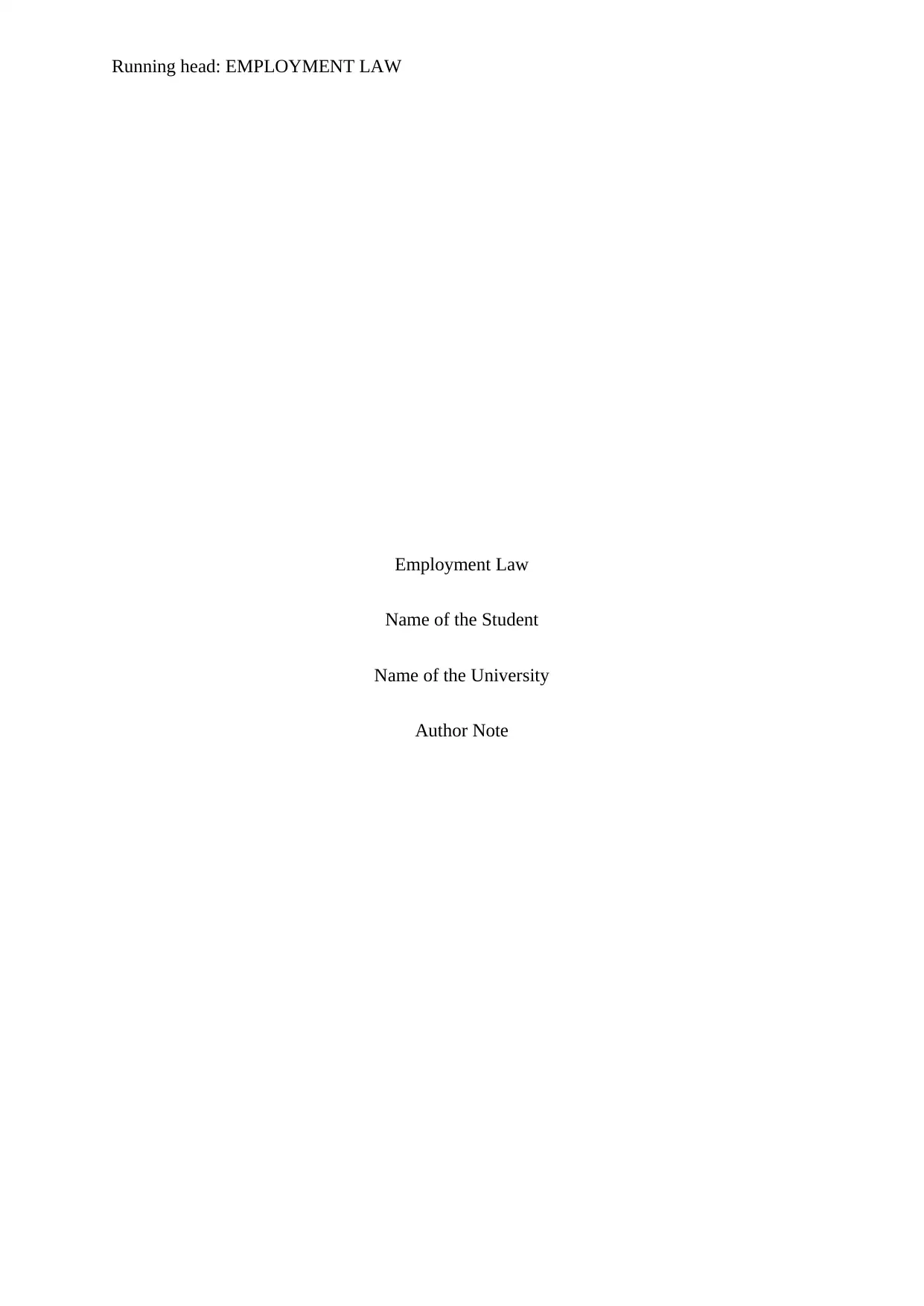
Running head: EMPLOYMENT LAW
Employment Law
Name of the Student
Name of the University
Author Note
Employment Law
Name of the Student
Name of the University
Author Note
Paraphrase This Document
Need a fresh take? Get an instant paraphrase of this document with our AI Paraphraser
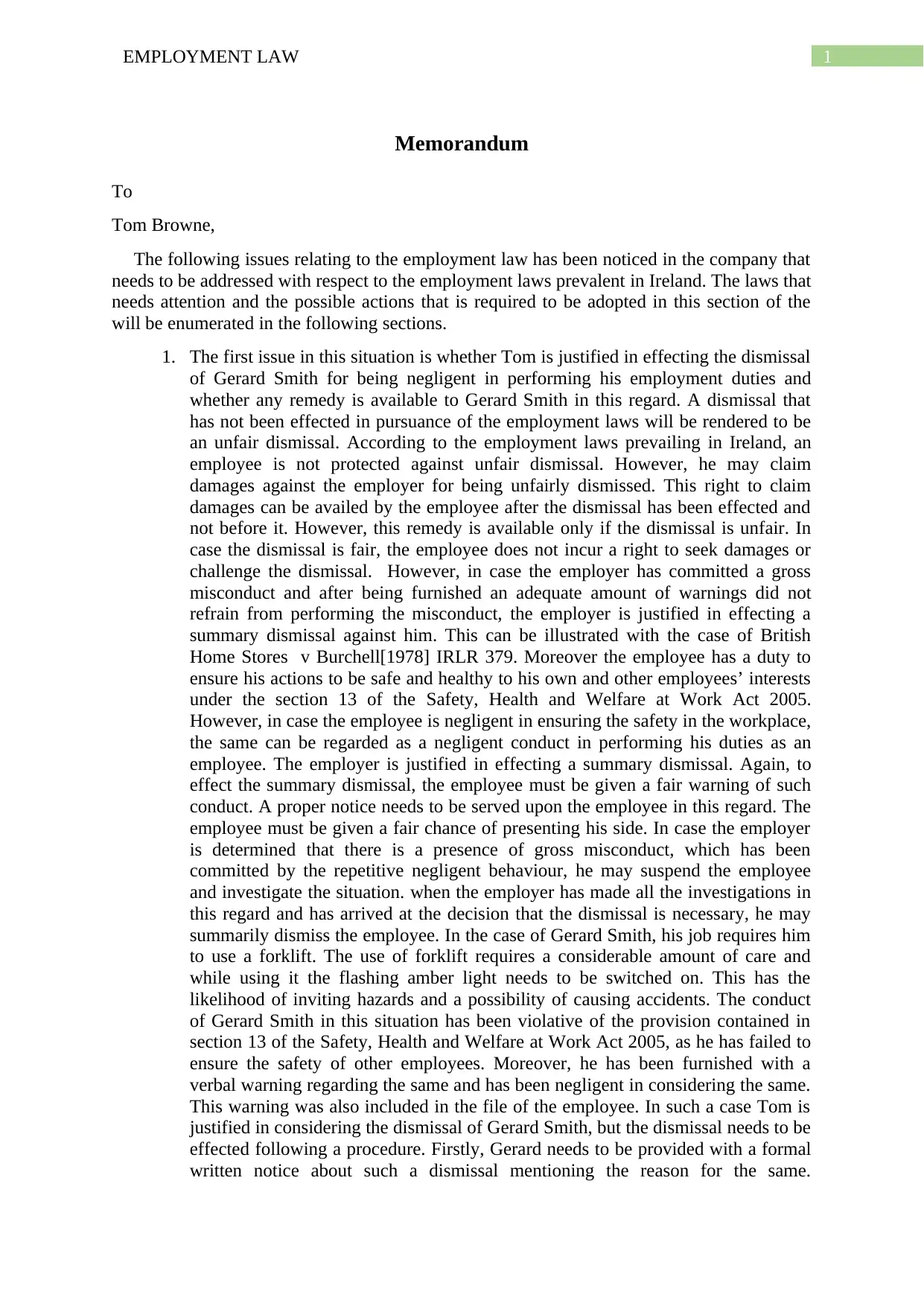
1EMPLOYMENT LAW
Memorandum
To
Tom Browne,
The following issues relating to the employment law has been noticed in the company that
needs to be addressed with respect to the employment laws prevalent in Ireland. The laws that
needs attention and the possible actions that is required to be adopted in this section of the
will be enumerated in the following sections.
1. The first issue in this situation is whether Tom is justified in effecting the dismissal
of Gerard Smith for being negligent in performing his employment duties and
whether any remedy is available to Gerard Smith in this regard. A dismissal that
has not been effected in pursuance of the employment laws will be rendered to be
an unfair dismissal. According to the employment laws prevailing in Ireland, an
employee is not protected against unfair dismissal. However, he may claim
damages against the employer for being unfairly dismissed. This right to claim
damages can be availed by the employee after the dismissal has been effected and
not before it. However, this remedy is available only if the dismissal is unfair. In
case the dismissal is fair, the employee does not incur a right to seek damages or
challenge the dismissal. However, in case the employer has committed a gross
misconduct and after being furnished an adequate amount of warnings did not
refrain from performing the misconduct, the employer is justified in effecting a
summary dismissal against him. This can be illustrated with the case of British
Home Stores v Burchell[1978] IRLR 379. Moreover the employee has a duty to
ensure his actions to be safe and healthy to his own and other employees’ interests
under the section 13 of the Safety, Health and Welfare at Work Act 2005.
However, in case the employee is negligent in ensuring the safety in the workplace,
the same can be regarded as a negligent conduct in performing his duties as an
employee. The employer is justified in effecting a summary dismissal. Again, to
effect the summary dismissal, the employee must be given a fair warning of such
conduct. A proper notice needs to be served upon the employee in this regard. The
employee must be given a fair chance of presenting his side. In case the employer
is determined that there is a presence of gross misconduct, which has been
committed by the repetitive negligent behaviour, he may suspend the employee
and investigate the situation. when the employer has made all the investigations in
this regard and has arrived at the decision that the dismissal is necessary, he may
summarily dismiss the employee. In the case of Gerard Smith, his job requires him
to use a forklift. The use of forklift requires a considerable amount of care and
while using it the flashing amber light needs to be switched on. This has the
likelihood of inviting hazards and a possibility of causing accidents. The conduct
of Gerard Smith in this situation has been violative of the provision contained in
section 13 of the Safety, Health and Welfare at Work Act 2005, as he has failed to
ensure the safety of other employees. Moreover, he has been furnished with a
verbal warning regarding the same and has been negligent in considering the same.
This warning was also included in the file of the employee. In such a case Tom is
justified in considering the dismissal of Gerard Smith, but the dismissal needs to be
effected following a procedure. Firstly, Gerard needs to be provided with a formal
written notice about such a dismissal mentioning the reason for the same.
Memorandum
To
Tom Browne,
The following issues relating to the employment law has been noticed in the company that
needs to be addressed with respect to the employment laws prevalent in Ireland. The laws that
needs attention and the possible actions that is required to be adopted in this section of the
will be enumerated in the following sections.
1. The first issue in this situation is whether Tom is justified in effecting the dismissal
of Gerard Smith for being negligent in performing his employment duties and
whether any remedy is available to Gerard Smith in this regard. A dismissal that
has not been effected in pursuance of the employment laws will be rendered to be
an unfair dismissal. According to the employment laws prevailing in Ireland, an
employee is not protected against unfair dismissal. However, he may claim
damages against the employer for being unfairly dismissed. This right to claim
damages can be availed by the employee after the dismissal has been effected and
not before it. However, this remedy is available only if the dismissal is unfair. In
case the dismissal is fair, the employee does not incur a right to seek damages or
challenge the dismissal. However, in case the employer has committed a gross
misconduct and after being furnished an adequate amount of warnings did not
refrain from performing the misconduct, the employer is justified in effecting a
summary dismissal against him. This can be illustrated with the case of British
Home Stores v Burchell[1978] IRLR 379. Moreover the employee has a duty to
ensure his actions to be safe and healthy to his own and other employees’ interests
under the section 13 of the Safety, Health and Welfare at Work Act 2005.
However, in case the employee is negligent in ensuring the safety in the workplace,
the same can be regarded as a negligent conduct in performing his duties as an
employee. The employer is justified in effecting a summary dismissal. Again, to
effect the summary dismissal, the employee must be given a fair warning of such
conduct. A proper notice needs to be served upon the employee in this regard. The
employee must be given a fair chance of presenting his side. In case the employer
is determined that there is a presence of gross misconduct, which has been
committed by the repetitive negligent behaviour, he may suspend the employee
and investigate the situation. when the employer has made all the investigations in
this regard and has arrived at the decision that the dismissal is necessary, he may
summarily dismiss the employee. In the case of Gerard Smith, his job requires him
to use a forklift. The use of forklift requires a considerable amount of care and
while using it the flashing amber light needs to be switched on. This has the
likelihood of inviting hazards and a possibility of causing accidents. The conduct
of Gerard Smith in this situation has been violative of the provision contained in
section 13 of the Safety, Health and Welfare at Work Act 2005, as he has failed to
ensure the safety of other employees. Moreover, he has been furnished with a
verbal warning regarding the same and has been negligent in considering the same.
This warning was also included in the file of the employee. In such a case Tom is
justified in considering the dismissal of Gerard Smith, but the dismissal needs to be
effected following a procedure. Firstly, Gerard needs to be provided with a formal
written notice about such a dismissal mentioning the reason for the same.
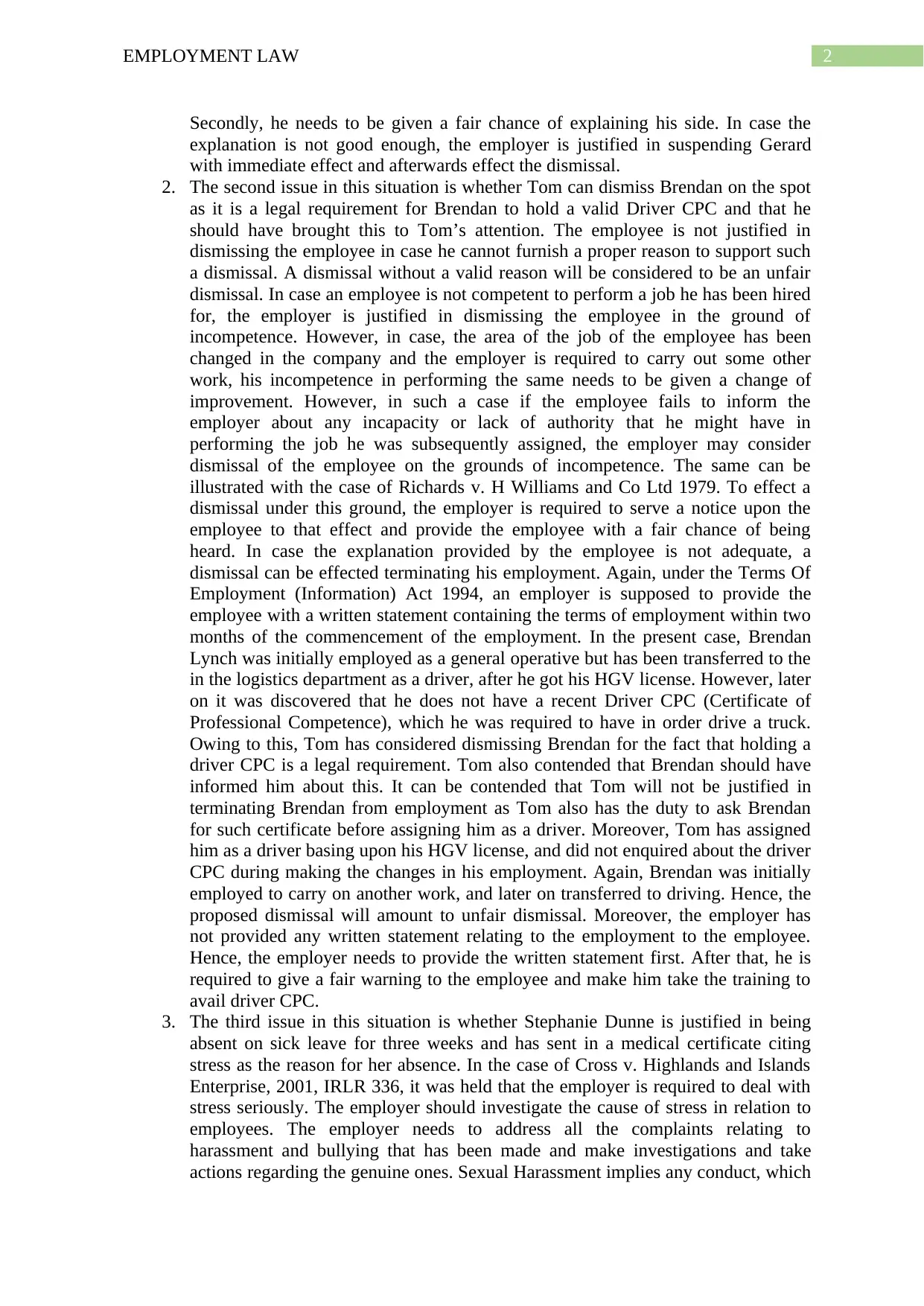
2EMPLOYMENT LAW
Secondly, he needs to be given a fair chance of explaining his side. In case the
explanation is not good enough, the employer is justified in suspending Gerard
with immediate effect and afterwards effect the dismissal.
2. The second issue in this situation is whether Tom can dismiss Brendan on the spot
as it is a legal requirement for Brendan to hold a valid Driver CPC and that he
should have brought this to Tom’s attention. The employee is not justified in
dismissing the employee in case he cannot furnish a proper reason to support such
a dismissal. A dismissal without a valid reason will be considered to be an unfair
dismissal. In case an employee is not competent to perform a job he has been hired
for, the employer is justified in dismissing the employee in the ground of
incompetence. However, in case, the area of the job of the employee has been
changed in the company and the employer is required to carry out some other
work, his incompetence in performing the same needs to be given a change of
improvement. However, in such a case if the employee fails to inform the
employer about any incapacity or lack of authority that he might have in
performing the job he was subsequently assigned, the employer may consider
dismissal of the employee on the grounds of incompetence. The same can be
illustrated with the case of Richards v. H Williams and Co Ltd 1979. To effect a
dismissal under this ground, the employer is required to serve a notice upon the
employee to that effect and provide the employee with a fair chance of being
heard. In case the explanation provided by the employee is not adequate, a
dismissal can be effected terminating his employment. Again, under the Terms Of
Employment (Information) Act 1994, an employer is supposed to provide the
employee with a written statement containing the terms of employment within two
months of the commencement of the employment. In the present case, Brendan
Lynch was initially employed as a general operative but has been transferred to the
in the logistics department as a driver, after he got his HGV license. However, later
on it was discovered that he does not have a recent Driver CPC (Certificate of
Professional Competence), which he was required to have in order drive a truck.
Owing to this, Tom has considered dismissing Brendan for the fact that holding a
driver CPC is a legal requirement. Tom also contended that Brendan should have
informed him about this. It can be contended that Tom will not be justified in
terminating Brendan from employment as Tom also has the duty to ask Brendan
for such certificate before assigning him as a driver. Moreover, Tom has assigned
him as a driver basing upon his HGV license, and did not enquired about the driver
CPC during making the changes in his employment. Again, Brendan was initially
employed to carry on another work, and later on transferred to driving. Hence, the
proposed dismissal will amount to unfair dismissal. Moreover, the employer has
not provided any written statement relating to the employment to the employee.
Hence, the employer needs to provide the written statement first. After that, he is
required to give a fair warning to the employee and make him take the training to
avail driver CPC.
3. The third issue in this situation is whether Stephanie Dunne is justified in being
absent on sick leave for three weeks and has sent in a medical certificate citing
stress as the reason for her absence. In the case of Cross v. Highlands and Islands
Enterprise, 2001, IRLR 336, it was held that the employer is required to deal with
stress seriously. The employer should investigate the cause of stress in relation to
employees. The employer needs to address all the complaints relating to
harassment and bullying that has been made and make investigations and take
actions regarding the genuine ones. Sexual Harassment implies any conduct, which
Secondly, he needs to be given a fair chance of explaining his side. In case the
explanation is not good enough, the employer is justified in suspending Gerard
with immediate effect and afterwards effect the dismissal.
2. The second issue in this situation is whether Tom can dismiss Brendan on the spot
as it is a legal requirement for Brendan to hold a valid Driver CPC and that he
should have brought this to Tom’s attention. The employee is not justified in
dismissing the employee in case he cannot furnish a proper reason to support such
a dismissal. A dismissal without a valid reason will be considered to be an unfair
dismissal. In case an employee is not competent to perform a job he has been hired
for, the employer is justified in dismissing the employee in the ground of
incompetence. However, in case, the area of the job of the employee has been
changed in the company and the employer is required to carry out some other
work, his incompetence in performing the same needs to be given a change of
improvement. However, in such a case if the employee fails to inform the
employer about any incapacity or lack of authority that he might have in
performing the job he was subsequently assigned, the employer may consider
dismissal of the employee on the grounds of incompetence. The same can be
illustrated with the case of Richards v. H Williams and Co Ltd 1979. To effect a
dismissal under this ground, the employer is required to serve a notice upon the
employee to that effect and provide the employee with a fair chance of being
heard. In case the explanation provided by the employee is not adequate, a
dismissal can be effected terminating his employment. Again, under the Terms Of
Employment (Information) Act 1994, an employer is supposed to provide the
employee with a written statement containing the terms of employment within two
months of the commencement of the employment. In the present case, Brendan
Lynch was initially employed as a general operative but has been transferred to the
in the logistics department as a driver, after he got his HGV license. However, later
on it was discovered that he does not have a recent Driver CPC (Certificate of
Professional Competence), which he was required to have in order drive a truck.
Owing to this, Tom has considered dismissing Brendan for the fact that holding a
driver CPC is a legal requirement. Tom also contended that Brendan should have
informed him about this. It can be contended that Tom will not be justified in
terminating Brendan from employment as Tom also has the duty to ask Brendan
for such certificate before assigning him as a driver. Moreover, Tom has assigned
him as a driver basing upon his HGV license, and did not enquired about the driver
CPC during making the changes in his employment. Again, Brendan was initially
employed to carry on another work, and later on transferred to driving. Hence, the
proposed dismissal will amount to unfair dismissal. Moreover, the employer has
not provided any written statement relating to the employment to the employee.
Hence, the employer needs to provide the written statement first. After that, he is
required to give a fair warning to the employee and make him take the training to
avail driver CPC.
3. The third issue in this situation is whether Stephanie Dunne is justified in being
absent on sick leave for three weeks and has sent in a medical certificate citing
stress as the reason for her absence. In the case of Cross v. Highlands and Islands
Enterprise, 2001, IRLR 336, it was held that the employer is required to deal with
stress seriously. The employer should investigate the cause of stress in relation to
employees. The employer needs to address all the complaints relating to
harassment and bullying that has been made and make investigations and take
actions regarding the genuine ones. Sexual Harassment implies any conduct, which
⊘ This is a preview!⊘
Do you want full access?
Subscribe today to unlock all pages.

Trusted by 1+ million students worldwide
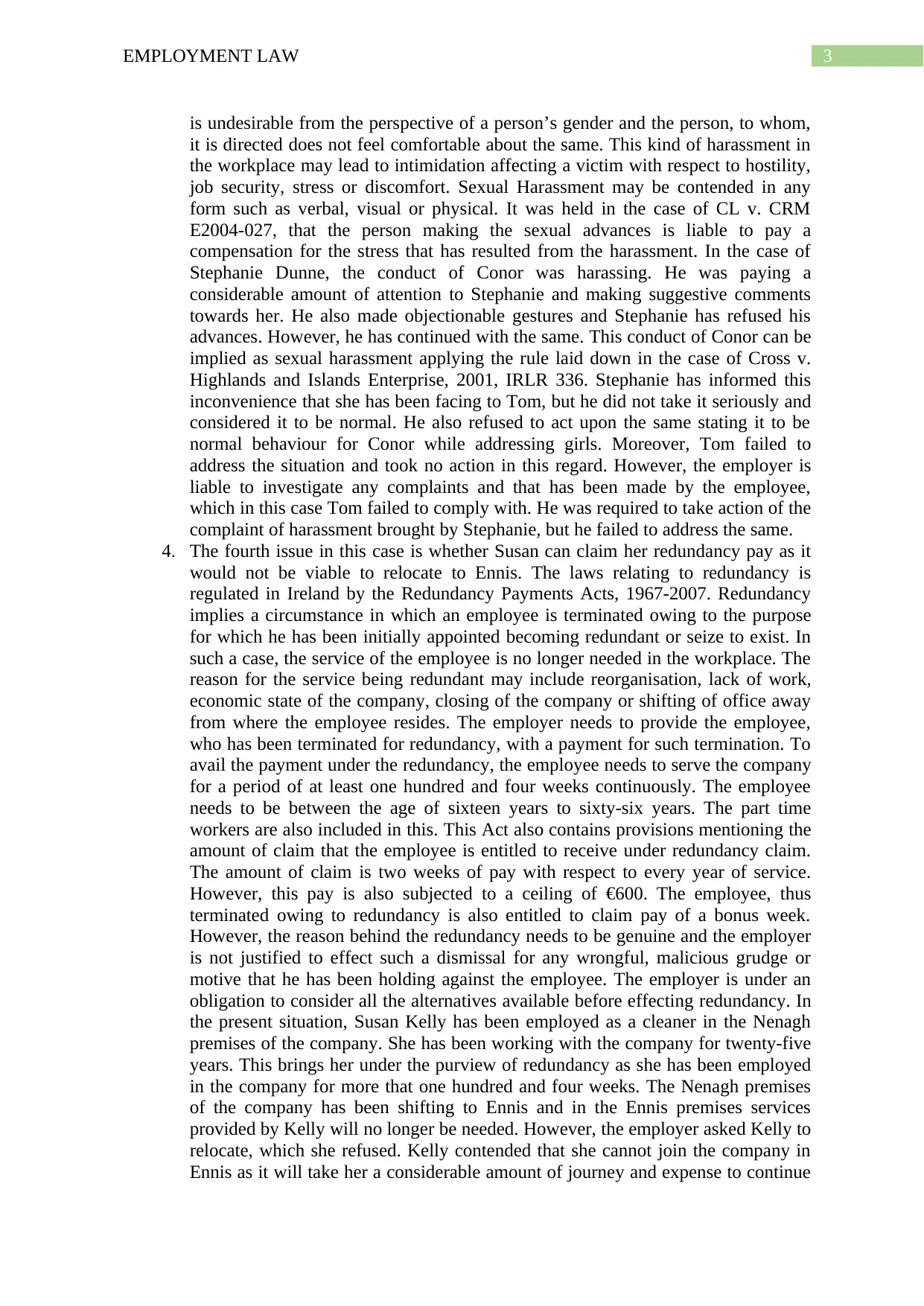
3EMPLOYMENT LAW
is undesirable from the perspective of a person’s gender and the person, to whom,
it is directed does not feel comfortable about the same. This kind of harassment in
the workplace may lead to intimidation affecting a victim with respect to hostility,
job security, stress or discomfort. Sexual Harassment may be contended in any
form such as verbal, visual or physical. It was held in the case of CL v. CRM
E2004-027, that the person making the sexual advances is liable to pay a
compensation for the stress that has resulted from the harassment. In the case of
Stephanie Dunne, the conduct of Conor was harassing. He was paying a
considerable amount of attention to Stephanie and making suggestive comments
towards her. He also made objectionable gestures and Stephanie has refused his
advances. However, he has continued with the same. This conduct of Conor can be
implied as sexual harassment applying the rule laid down in the case of Cross v.
Highlands and Islands Enterprise, 2001, IRLR 336. Stephanie has informed this
inconvenience that she has been facing to Tom, but he did not take it seriously and
considered it to be normal. He also refused to act upon the same stating it to be
normal behaviour for Conor while addressing girls. Moreover, Tom failed to
address the situation and took no action in this regard. However, the employer is
liable to investigate any complaints and that has been made by the employee,
which in this case Tom failed to comply with. He was required to take action of the
complaint of harassment brought by Stephanie, but he failed to address the same.
4. The fourth issue in this case is whether Susan can claim her redundancy pay as it
would not be viable to relocate to Ennis. The laws relating to redundancy is
regulated in Ireland by the Redundancy Payments Acts, 1967-2007. Redundancy
implies a circumstance in which an employee is terminated owing to the purpose
for which he has been initially appointed becoming redundant or seize to exist. In
such a case, the service of the employee is no longer needed in the workplace. The
reason for the service being redundant may include reorganisation, lack of work,
economic state of the company, closing of the company or shifting of office away
from where the employee resides. The employer needs to provide the employee,
who has been terminated for redundancy, with a payment for such termination. To
avail the payment under the redundancy, the employee needs to serve the company
for a period of at least one hundred and four weeks continuously. The employee
needs to be between the age of sixteen years to sixty-six years. The part time
workers are also included in this. This Act also contains provisions mentioning the
amount of claim that the employee is entitled to receive under redundancy claim.
The amount of claim is two weeks of pay with respect to every year of service.
However, this pay is also subjected to a ceiling of €600. The employee, thus
terminated owing to redundancy is also entitled to claim pay of a bonus week.
However, the reason behind the redundancy needs to be genuine and the employer
is not justified to effect such a dismissal for any wrongful, malicious grudge or
motive that he has been holding against the employee. The employer is under an
obligation to consider all the alternatives available before effecting redundancy. In
the present situation, Susan Kelly has been employed as a cleaner in the Nenagh
premises of the company. She has been working with the company for twenty-five
years. This brings her under the purview of redundancy as she has been employed
in the company for more that one hundred and four weeks. The Nenagh premises
of the company has been shifting to Ennis and in the Ennis premises services
provided by Kelly will no longer be needed. However, the employer asked Kelly to
relocate, which she refused. Kelly contended that she cannot join the company in
Ennis as it will take her a considerable amount of journey and expense to continue
is undesirable from the perspective of a person’s gender and the person, to whom,
it is directed does not feel comfortable about the same. This kind of harassment in
the workplace may lead to intimidation affecting a victim with respect to hostility,
job security, stress or discomfort. Sexual Harassment may be contended in any
form such as verbal, visual or physical. It was held in the case of CL v. CRM
E2004-027, that the person making the sexual advances is liable to pay a
compensation for the stress that has resulted from the harassment. In the case of
Stephanie Dunne, the conduct of Conor was harassing. He was paying a
considerable amount of attention to Stephanie and making suggestive comments
towards her. He also made objectionable gestures and Stephanie has refused his
advances. However, he has continued with the same. This conduct of Conor can be
implied as sexual harassment applying the rule laid down in the case of Cross v.
Highlands and Islands Enterprise, 2001, IRLR 336. Stephanie has informed this
inconvenience that she has been facing to Tom, but he did not take it seriously and
considered it to be normal. He also refused to act upon the same stating it to be
normal behaviour for Conor while addressing girls. Moreover, Tom failed to
address the situation and took no action in this regard. However, the employer is
liable to investigate any complaints and that has been made by the employee,
which in this case Tom failed to comply with. He was required to take action of the
complaint of harassment brought by Stephanie, but he failed to address the same.
4. The fourth issue in this case is whether Susan can claim her redundancy pay as it
would not be viable to relocate to Ennis. The laws relating to redundancy is
regulated in Ireland by the Redundancy Payments Acts, 1967-2007. Redundancy
implies a circumstance in which an employee is terminated owing to the purpose
for which he has been initially appointed becoming redundant or seize to exist. In
such a case, the service of the employee is no longer needed in the workplace. The
reason for the service being redundant may include reorganisation, lack of work,
economic state of the company, closing of the company or shifting of office away
from where the employee resides. The employer needs to provide the employee,
who has been terminated for redundancy, with a payment for such termination. To
avail the payment under the redundancy, the employee needs to serve the company
for a period of at least one hundred and four weeks continuously. The employee
needs to be between the age of sixteen years to sixty-six years. The part time
workers are also included in this. This Act also contains provisions mentioning the
amount of claim that the employee is entitled to receive under redundancy claim.
The amount of claim is two weeks of pay with respect to every year of service.
However, this pay is also subjected to a ceiling of €600. The employee, thus
terminated owing to redundancy is also entitled to claim pay of a bonus week.
However, the reason behind the redundancy needs to be genuine and the employer
is not justified to effect such a dismissal for any wrongful, malicious grudge or
motive that he has been holding against the employee. The employer is under an
obligation to consider all the alternatives available before effecting redundancy. In
the present situation, Susan Kelly has been employed as a cleaner in the Nenagh
premises of the company. She has been working with the company for twenty-five
years. This brings her under the purview of redundancy as she has been employed
in the company for more that one hundred and four weeks. The Nenagh premises
of the company has been shifting to Ennis and in the Ennis premises services
provided by Kelly will no longer be needed. However, the employer asked Kelly to
relocate, which she refused. Kelly contended that she cannot join the company in
Ennis as it will take her a considerable amount of journey and expense to continue
Paraphrase This Document
Need a fresh take? Get an instant paraphrase of this document with our AI Paraphraser
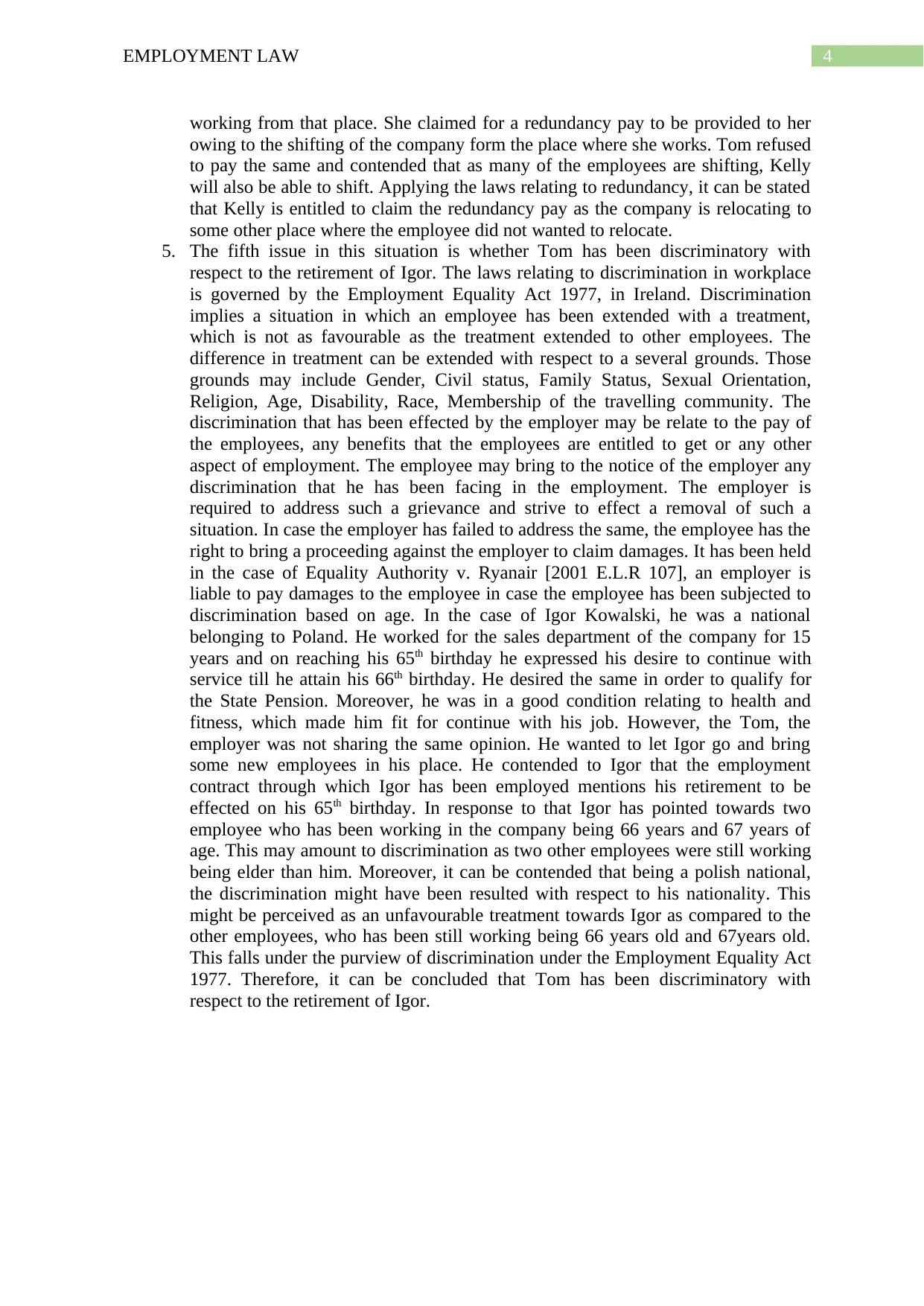
4EMPLOYMENT LAW
working from that place. She claimed for a redundancy pay to be provided to her
owing to the shifting of the company form the place where she works. Tom refused
to pay the same and contended that as many of the employees are shifting, Kelly
will also be able to shift. Applying the laws relating to redundancy, it can be stated
that Kelly is entitled to claim the redundancy pay as the company is relocating to
some other place where the employee did not wanted to relocate.
5. The fifth issue in this situation is whether Tom has been discriminatory with
respect to the retirement of Igor. The laws relating to discrimination in workplace
is governed by the Employment Equality Act 1977, in Ireland. Discrimination
implies a situation in which an employee has been extended with a treatment,
which is not as favourable as the treatment extended to other employees. The
difference in treatment can be extended with respect to a several grounds. Those
grounds may include Gender, Civil status, Family Status, Sexual Orientation,
Religion, Age, Disability, Race, Membership of the travelling community. The
discrimination that has been effected by the employer may be relate to the pay of
the employees, any benefits that the employees are entitled to get or any other
aspect of employment. The employee may bring to the notice of the employer any
discrimination that he has been facing in the employment. The employer is
required to address such a grievance and strive to effect a removal of such a
situation. In case the employer has failed to address the same, the employee has the
right to bring a proceeding against the employer to claim damages. It has been held
in the case of Equality Authority v. Ryanair [2001 E.L.R 107], an employer is
liable to pay damages to the employee in case the employee has been subjected to
discrimination based on age. In the case of Igor Kowalski, he was a national
belonging to Poland. He worked for the sales department of the company for 15
years and on reaching his 65th birthday he expressed his desire to continue with
service till he attain his 66th birthday. He desired the same in order to qualify for
the State Pension. Moreover, he was in a good condition relating to health and
fitness, which made him fit for continue with his job. However, the Tom, the
employer was not sharing the same opinion. He wanted to let Igor go and bring
some new employees in his place. He contended to Igor that the employment
contract through which Igor has been employed mentions his retirement to be
effected on his 65th birthday. In response to that Igor has pointed towards two
employee who has been working in the company being 66 years and 67 years of
age. This may amount to discrimination as two other employees were still working
being elder than him. Moreover, it can be contended that being a polish national,
the discrimination might have been resulted with respect to his nationality. This
might be perceived as an unfavourable treatment towards Igor as compared to the
other employees, who has been still working being 66 years old and 67years old.
This falls under the purview of discrimination under the Employment Equality Act
1977. Therefore, it can be concluded that Tom has been discriminatory with
respect to the retirement of Igor.
working from that place. She claimed for a redundancy pay to be provided to her
owing to the shifting of the company form the place where she works. Tom refused
to pay the same and contended that as many of the employees are shifting, Kelly
will also be able to shift. Applying the laws relating to redundancy, it can be stated
that Kelly is entitled to claim the redundancy pay as the company is relocating to
some other place where the employee did not wanted to relocate.
5. The fifth issue in this situation is whether Tom has been discriminatory with
respect to the retirement of Igor. The laws relating to discrimination in workplace
is governed by the Employment Equality Act 1977, in Ireland. Discrimination
implies a situation in which an employee has been extended with a treatment,
which is not as favourable as the treatment extended to other employees. The
difference in treatment can be extended with respect to a several grounds. Those
grounds may include Gender, Civil status, Family Status, Sexual Orientation,
Religion, Age, Disability, Race, Membership of the travelling community. The
discrimination that has been effected by the employer may be relate to the pay of
the employees, any benefits that the employees are entitled to get or any other
aspect of employment. The employee may bring to the notice of the employer any
discrimination that he has been facing in the employment. The employer is
required to address such a grievance and strive to effect a removal of such a
situation. In case the employer has failed to address the same, the employee has the
right to bring a proceeding against the employer to claim damages. It has been held
in the case of Equality Authority v. Ryanair [2001 E.L.R 107], an employer is
liable to pay damages to the employee in case the employee has been subjected to
discrimination based on age. In the case of Igor Kowalski, he was a national
belonging to Poland. He worked for the sales department of the company for 15
years and on reaching his 65th birthday he expressed his desire to continue with
service till he attain his 66th birthday. He desired the same in order to qualify for
the State Pension. Moreover, he was in a good condition relating to health and
fitness, which made him fit for continue with his job. However, the Tom, the
employer was not sharing the same opinion. He wanted to let Igor go and bring
some new employees in his place. He contended to Igor that the employment
contract through which Igor has been employed mentions his retirement to be
effected on his 65th birthday. In response to that Igor has pointed towards two
employee who has been working in the company being 66 years and 67 years of
age. This may amount to discrimination as two other employees were still working
being elder than him. Moreover, it can be contended that being a polish national,
the discrimination might have been resulted with respect to his nationality. This
might be perceived as an unfavourable treatment towards Igor as compared to the
other employees, who has been still working being 66 years old and 67years old.
This falls under the purview of discrimination under the Employment Equality Act
1977. Therefore, it can be concluded that Tom has been discriminatory with
respect to the retirement of Igor.
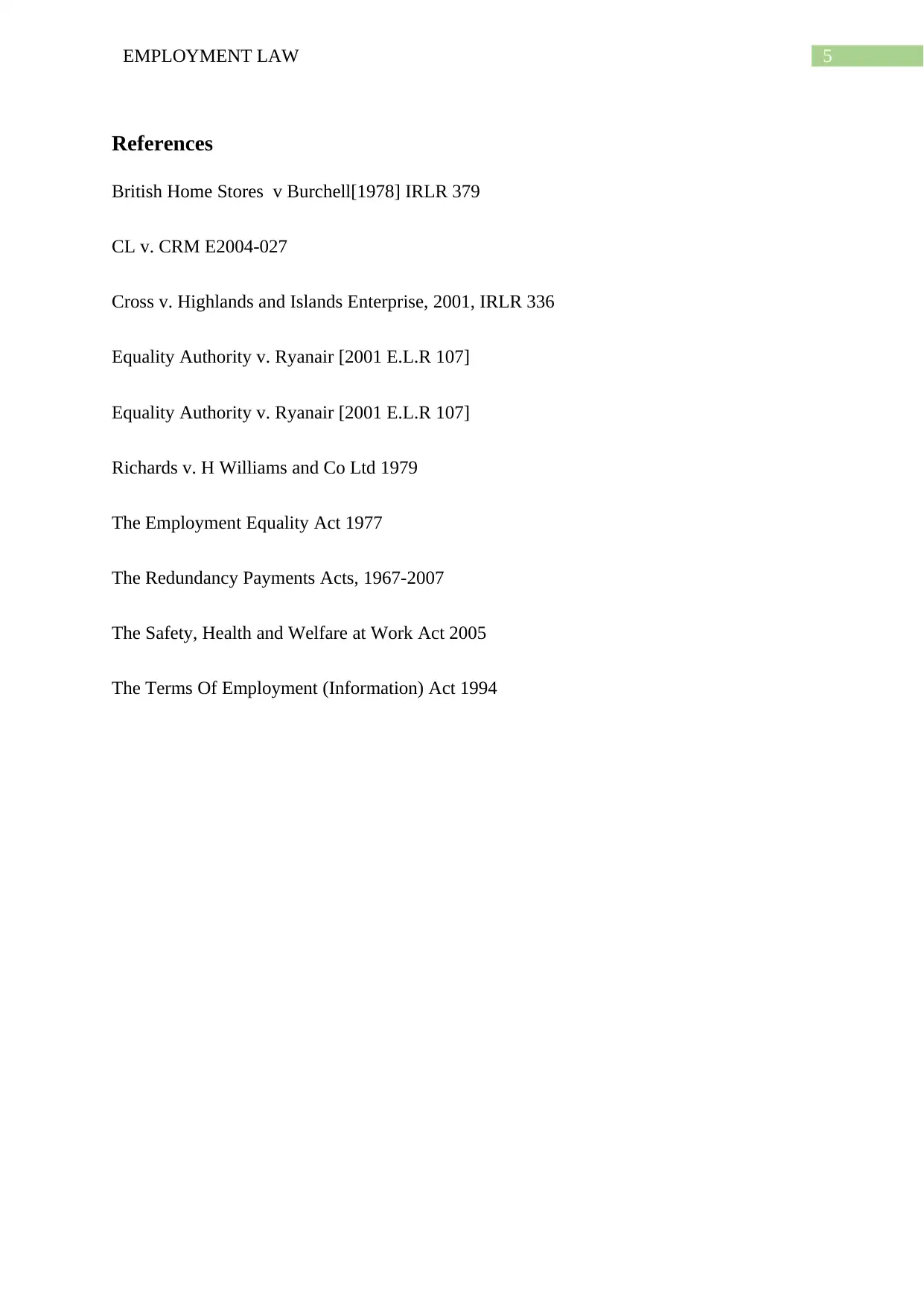
5EMPLOYMENT LAW
References
British Home Stores v Burchell[1978] IRLR 379
CL v. CRM E2004-027
Cross v. Highlands and Islands Enterprise, 2001, IRLR 336
Equality Authority v. Ryanair [2001 E.L.R 107]
Equality Authority v. Ryanair [2001 E.L.R 107]
Richards v. H Williams and Co Ltd 1979
The Employment Equality Act 1977
The Redundancy Payments Acts, 1967-2007
The Safety, Health and Welfare at Work Act 2005
The Terms Of Employment (Information) Act 1994
References
British Home Stores v Burchell[1978] IRLR 379
CL v. CRM E2004-027
Cross v. Highlands and Islands Enterprise, 2001, IRLR 336
Equality Authority v. Ryanair [2001 E.L.R 107]
Equality Authority v. Ryanair [2001 E.L.R 107]
Richards v. H Williams and Co Ltd 1979
The Employment Equality Act 1977
The Redundancy Payments Acts, 1967-2007
The Safety, Health and Welfare at Work Act 2005
The Terms Of Employment (Information) Act 1994
⊘ This is a preview!⊘
Do you want full access?
Subscribe today to unlock all pages.

Trusted by 1+ million students worldwide
1 out of 6
Related Documents
Your All-in-One AI-Powered Toolkit for Academic Success.
+13062052269
info@desklib.com
Available 24*7 on WhatsApp / Email
![[object Object]](/_next/static/media/star-bottom.7253800d.svg)
Unlock your academic potential
Copyright © 2020–2026 A2Z Services. All Rights Reserved. Developed and managed by ZUCOL.





